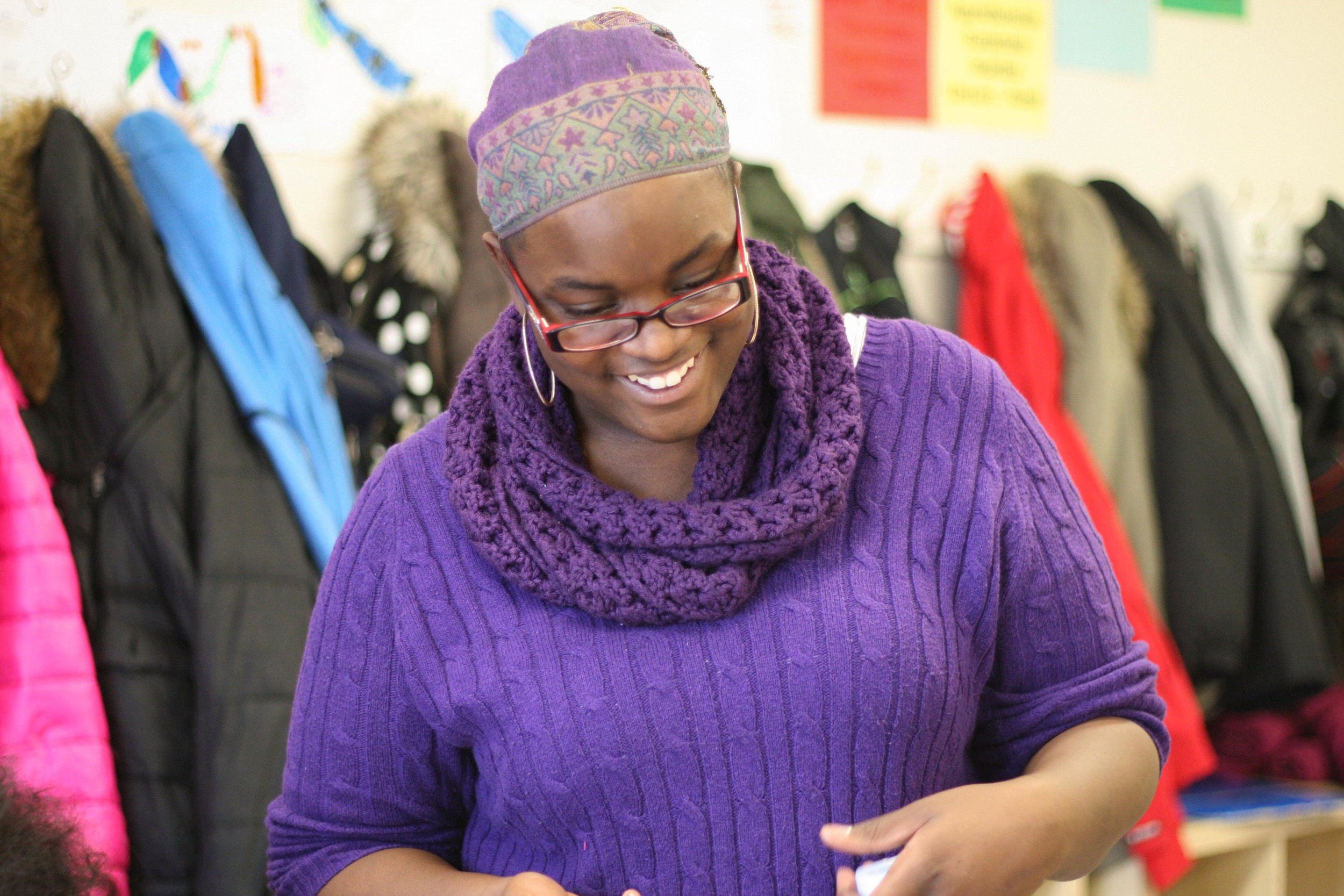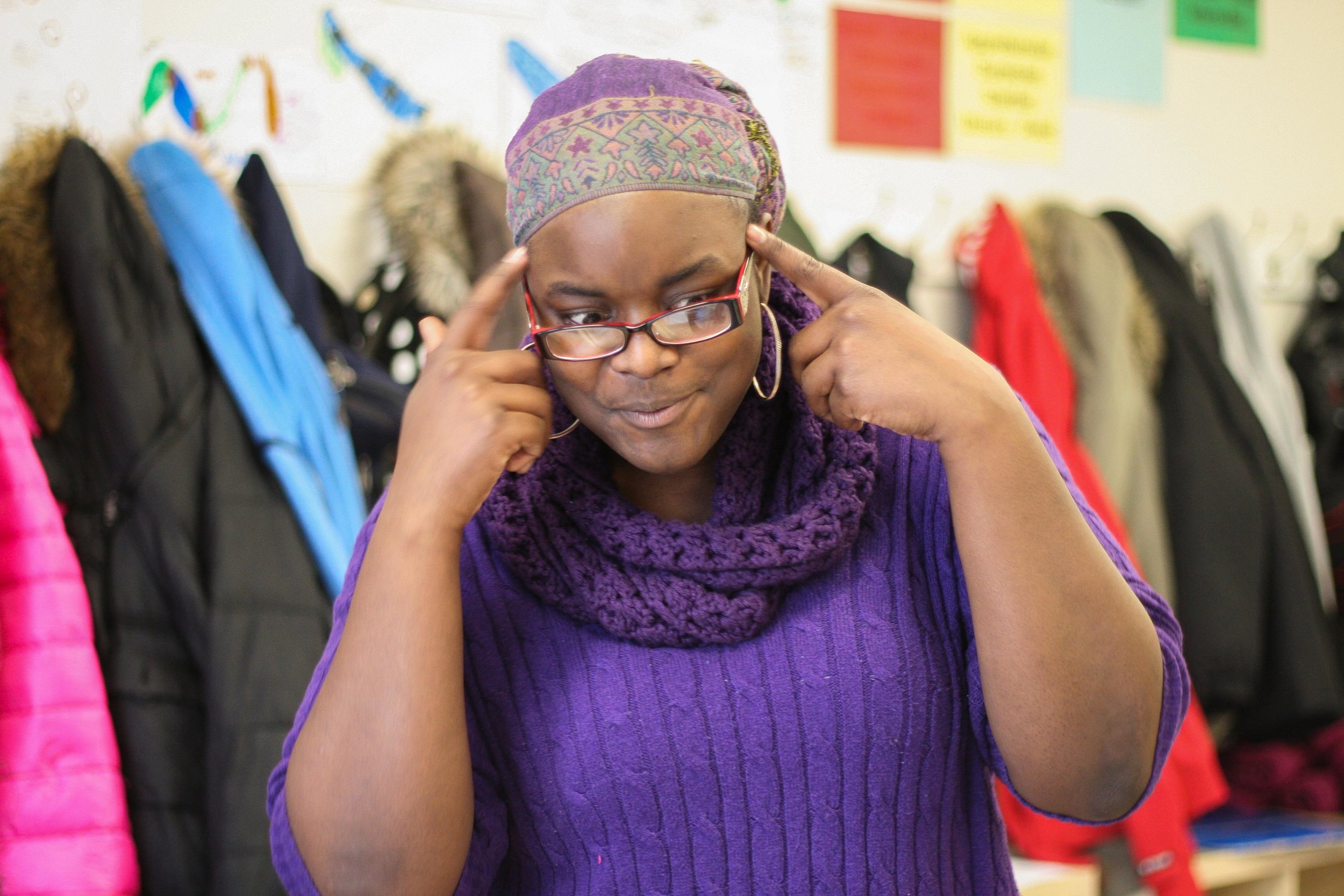Before Shaniqua Choice enrolled at the Sposato Graduate School of Education, she was selling cars at the Herb Chambers Infiniti dealership in Boston. She didn’t know much about cars, “but I was learning,” she told me. A 2009 graduate of Match High School, Choice attended an event celebrating Boston charter schools nearly a year ago when she bumped into her tutor from senior year, Ray Schleck, who is now a principal at Match. As the story goes, Schleck asked what she was up to, and encouraged her to return to her alma mater, this time as a teacher-in-training.
Studying to become a teacher wasn’t a random suggestion for Choice, a graduate of the Massachusetts College of Liberal Arts in North Adams, MA. She’d taught for a year at a charter high school in central MA after college graduation. But a poor experience in her first year had her questioning her long-term dream: to teach history, and African-American history in particular, at the college level.
Choice has great physical presence. She is tall with a powerful build, big gold hoop earrings, chunky glasses and a headscarf (“because I haven’t had time to get my hair done in forever.”) You’d never guess from watching her move around the classroom and interact with students, that she spent six weeks in the hospital earlier this year after doctors discovered -- and removed -- a fifteen pound tumor in her intestines. She left her hospital bed two weeks early because she was so eager to get back to work.
Choice works with one of her fifth grade students.
In the spring semester, like all first-year Sposato students, Choice student teaches twice a week. This week, her primary focus (what we call the “big takeaway”) was lesson preparation -- mastering the material, having a clear “target task” and planning the cognitive steps she wanted students to take -- with the end goal of enabling students to do the deep thinking on their own. Her preparation worked. Transitions between whole-class instruction and small group work were smooth, and the resulting conversation, about whether or not an actor who voices the characters in animated movies should reflect the same race as their characters, was robust, but respectful. “You did an awesome job,” Christine Schepeler, a Sposato instructor, said to Choice in a coaching session later.
When Choice isn’t student teaching, she works intensively with 10-12 fifth graders, usually, three or four at a time. In Hansel, Adrian, Rayven, and others, she sees herself: a kid of color who grew up without a lot of money, who wasn’t used to the intensive one-on-one attention that students at Match receive. “It can feel like a lot to have someone in your business all the time,” she says. “I really hated it at first and used to get in trouble all the time, but eventually I learned that my tutors were giving me feedback to help me be better.”
Choice says the similarities she and her pupils share, surprisingly, isn’t the connection point you’d think it would be. Building respectful, trusting relationships with kids by establishing a tone that is a blend of warm and strict is something she’s had to work at. In her first teaching job, she tried the approach lots of first-year teachers gravitate to: being cool. “It didn’t work -- the kids didn’t respect me,” she says. “This year I’ve made a conscious effort to marry high expectations and love: I love you, so I want you to do well.”
Schleck, Choice’s tutor during her senior year, leads Match Next. The campus, which is Match’s home for all of our fifth graders, is a new model that relies on tutors to provide individual and small group instruction to students. This is all to say, Schleck has seen nearly 100 tutors cycle through his campus in the last three years. What makes Choice so effective with his students? He highlighted three things: first, as a Match graduate, she has a baseline understanding of what kids are going through (and isn’t surprised by much); second, she’s self-reflective and able to internalize and implement feedback quickly; and third, she’s good at advocating for herself, so she’s able to ask for the support she needs from her supervisors and mentors.
That last piece, about asking for support from her supervisor and mentors, is a big reason why she chose Sposato instead of another program. Choice is explicit about her long-term goals of teaching at the college level, but as a step towards that final destination, she wanted to build her teaching skills first, including the organizational and classroom management techniques she knows she’ll need.
For now, though, she is getting excited about her new job next year, as a 10th grade history teacher at Community Charter School of Cambridge. “I’ll continue to give people lots of grace,” she told me.







